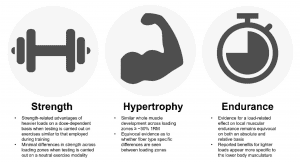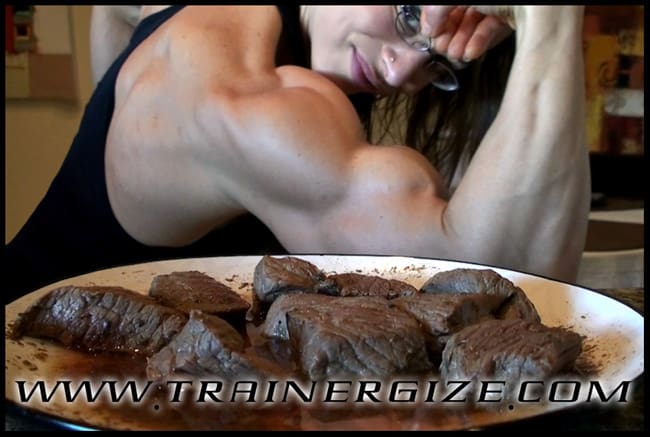Higher reps vs lower reps has been a debate for decades among those focused on hypertrophy, such as bodybuilders and casual lifters just looking to add some muscle mass. When people ask me what rep ranges are best for hypertrophy, my typical response is “all of them!”
There’s been a number of studies looking at higher rep ranges using lower loads that support the use of higher reps in programs focused on hypertrophy covered by Monica M HERE worth reading if you have not already. Anything by Monica is always worth reading, but I digress.
In 2018 via Schoenfeld et al, a large meta review of studies examining the topic and using a stringent inclusion and exclusion criteria for the review, that lower reps with higher % of 1RM and higher reps using lower % of 1RM have similar effects on hypertrophy. If the specific goal is improvements in 1RM in a given lift, than higher loads and lower reps is superior, although increases in 1RM strength does take place with higher rep/lower load training.
So should those focused strictly on hypertrophy drop the heavy lifting and just train in the 15-30 rep range? In my opinion, No. Is there a place for higher reps and lower loads in the program of people focused on hypertrophy? That’s a resounding yes! This section from the aforementioned review from summarizes nicely:
“The findings therefore indicate that both heavy and light loads can be equally effective in promoting muscle growth provided training is carried out with a high level of effort. Intriguingly, emerging research shows a potential fiber type-specific effect of loading zones, with heavier loads showing greater increases in type II muscle fiber cross sectional area and lighter loads showing greater increases in type I muscle fiber growth. If true, this implies a potential benefit to training across a spectrum of repetitions when to goal is maximize hypertrophic adaptations. That said, not all studies have found such an effect and further research is therefore needed to draw relevant practical inference…” (1)
Recently, another excellent review also by Schoenfeld et al (2) examined the topic of loading and volume and other variables and the effects on strength, hypertrophy, and muscular endurance, and concludes essentially the same thing: a wide variety of rep ranges can be effective and incorporated into a training program. With respect to hypertrophy, they state:
“…the compelling body of literature indicates that similar whole muscle growth (i.e., muscle thickness, CSA) can be achieved across a wide spectrum of loading ranges ≥ ~30% 1RM. These findings are independent of age and training status. Thus, as a matter of principle, there is no ideal “hypertrophy zone.” From a practical standpoint, however, a case can be made that moderate loads provide the most efficient means to achieve muscle development given that light load training involves performing many more repetitions compared to the use of heavier loads, which in turn increases the time spent training.”
 So does that put the debate to rest as to the optimal rep ranges for making gainz? No, but it does get us closer to an understanding of what can be effective, and it’s clearly less rigid than once thought. What’s the optimal rep ranges, who should use them (e.g., newbies vs experienced lifters, etc) and when? Lots of Qs yet to be answered, and those papers does bring that up also, so both worth a full read. I’ll also tell you this, if you think training at lower loads for higher reps is the “easy” way out, you have no idea the pain you’re about to experience during the training and the days that follow. Try three sets of squats to failure – close to it – in the 15-20 rep range and get back to me…
So does that put the debate to rest as to the optimal rep ranges for making gainz? No, but it does get us closer to an understanding of what can be effective, and it’s clearly less rigid than once thought. What’s the optimal rep ranges, who should use them (e.g., newbies vs experienced lifters, etc) and when? Lots of Qs yet to be answered, and those papers does bring that up also, so both worth a full read. I’ll also tell you this, if you think training at lower loads for higher reps is the “easy” way out, you have no idea the pain you’re about to experience during the training and the days that follow. Try three sets of squats to failure – close to it – in the 15-20 rep range and get back to me…

Source: Schoenfeld et al. Loading Recommendations for Muscle Strength, Hypertrophy, and Local Endurance: A Re-Examination of the Repetition Continuum. Sports 2021, 9(2), 32;
In conclusion, if hypertrophy is the goal, the inclusion of higher reps appears a viable and likely beneficial addition to a training program and worth some experimentation. My personal preference has been to do higher rep days or phases in a program vs in the same workout as lower reps and higher loads, say 10 reps and below.
In terms of a program to really help people dial in their program, see my rant HERE on how most bodybuilders are still stuck in the 70s, and my recommendation of an app people continue to give great feedback on. The developer of the app is constantly tweaking it as new data and feedback comes in, so like the science itself, and evolving app. See: Why Are So Many Bodybuilders Stuck in the 70s?
Sources:
(1) Schoenfeld., et al. Strength and hypertrophy adaptations between low- versus high-load resistance training: A systematic review and meta-analysis. The Journal of Strength and Conditioning Research · August 2017. Full Paper HERE.
(2) Schoenfeld., et al. Loading Recommendations for Muscle Strength, Hypertrophy, and Local Endurance: A Re-Examination of the Repetition Continuum. Full Paper HERE.
Will Brink is the owner of the Brinkzone Blog. Will has over 30 years experience as a respected author, columnist and consultant, to the supplement, fitness, bodybuilding, and weight loss industry and has been extensively published. Will graduated from Harvard University with a concentration in the natural sciences, and is a consultant to major supplement, dairy, and pharmaceutical companies.
His often ground breaking articles can be found in publications such as Lets Live, Muscle Media 2000, MuscleMag International, The Life Extension Magazine, Muscle n Fitness, Inside Karate, Exercise For Men Only, Body International, Power, Oxygen, Penthouse, Women’s World and The Townsend Letter For Doctors.
He’s also been published in peer reviewed journals.
Will is the author of the popular e-books, both accompanied by private members forum access , Bodybuilding Revealed & Fat Loss Revealed.
You can also buy Will’s other books on Amazon, Apple iBook, and Barnes and Noble.







But for functional strength, heavy loads, low reps are mostly the way to go?
We may want stronger neural.pathways, tendons, ligaments, and bones..not just larger muscle bellies.
I am a male 78 yrs young. Have had both knees completely replaced 3 times during my many yrs of life. Anyway here is my question. I would like to add some muscle growth in my arms and forearms. I have been lifting for several yrs now and I really don’t see much improvement in growth in me arms. I have been doing reps starting with fairly light weights for 12 reps, then add more weight and do 10 reps, then add more weight and do 8 reps, and finally add some more weight for 6 reps. Some times I will do another set for 4 reps. been trying to also lose about 10-12lbs since I am a diabetic to help my overall health. I have a few other medical issues as well. I realize this info does not really give you much to go on as to an opinion or two, but I just thought asking would not hurt.
Thanks,
Don